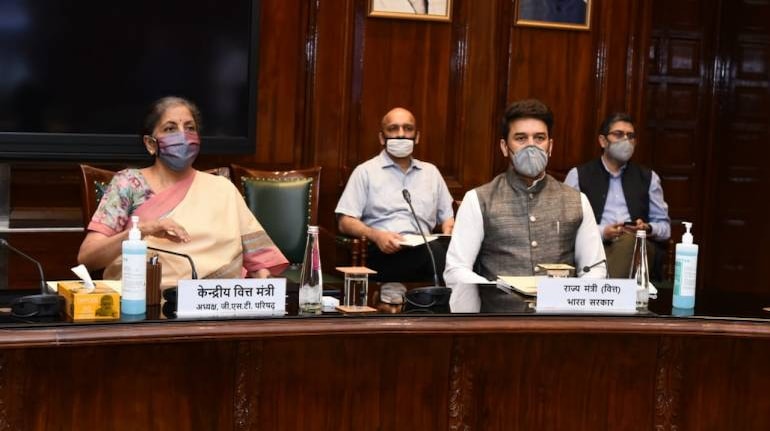



The Goods and Services Tax (GST) Council, in its meeting on May 28, may take up the issue of inverted duty structures in key sectors that ends up making import duties on input goods higher than on finished goods, Moneycontrol has learnt.
The agenda of the meeting, which will be chaired by Finance Minister Nirmala Sitharaman, will likely include discussions on reducing or zero-rating GST on essential COVID supplies, extending the compensation period for states, and merging the 12 and 18 percent slabs.
When asked why the Centre would want to discuss the inverted duty structure amidst a packed agenda, a senior official said the intention is to have a productive meeting.
"The Centre has recently clarified that the reason for reducing GST on essential items in the fight against COVID pertained to input tax credit. The issue of correcting duties is seen as a less divisive one, which enjoys broad support among all stakeholders," he said.
The official said that the Centre was being realistic and he did not expect the council to look into the matter immediately. Instead, an in-principle decision for a relook at import duties will be proposed. A committee may also be formed, depending on the council’s stance, he said.
As a result of the current anomaly, the GST rate on purchases is more than what is payable on sales. This structure has led to many administrative-level issues. Businesses paying taxes under this structure continue to have Input Tax Credit (ITC) in their ledger even after paying off the output tax liability, leading to crucial working capital remaining stuck in the form of credit.
Since the beginning of the pandemic, the domestic industry has requested the government multiple times to fix the problem of higher input prices, especially in raw material-dependent sectors such automobiles, electronics, steel and textiles.
"In August 2020, we had submitted a paper on export strategy to the government. We had clearly said that India can't ignore the general principle of higher duties on finished goods and lower or minimal duties on intermediates and raw materials, if it wants to see exports grow consistently," a senior CII functionary said on conditions of anonymity.
The current system often incentivises export of raw materials and not value-added products, he added.
Global prices rise
With the global commodity supercycle now seeing prices rise to record highs, domestic user industries say the need to address high import duties for raw materials is needed quickly.
A sudden price rise over the past three months of key input materials such as steel, chemicals and plastics have raised the cost of manufacturing and hit exporters hard even as most are facing a liquidity crisis.
"This comes even as export orders from major markets such as the US, European Union and the UAE have shot up. After nearly a year of pandemic-induced slowdown, exporters are keen to get a hold of this new business but high cost of raw material remains a challenge,” Ajay Sahai, Director- General, Federation of Indian Export Organisations (FIEO), said.
In a series of recent meetings, exporters have asked the government to consider temporary price caps on input materials and restrictions on the export of primary goods such as raw steel and financial assistance to the sector, industry insiders say. The inverted duty structure issue has featured prominently in at least two previous GST Council meets till now, so the challenges are well known to the government, they added.
The Engineering Exports Promotion Council (EEPC) had requested the government's urgent intervention, back in January, when the wholesale price of steel products such as Hot Rolled Coil (HRC) had shot up to Rs 58,000 a tonne. Sustained pressure on the issue had led to the government slashing customs duties uniformly to 7.5 percent on key iron and steel items, along with duty exemption on steel scrap up to March 2022. Now, EEPC says other items must be tackled.
Apart from a rate reduction on domestically produced COVID essentials, the GST Council is set to see discussions on the extension for GST compensation that states are entitled to receive from the Centre and crucial support to the domestic industry through the release of pending GST refunds.
Reports have suggested the council may also consider reducing late fees for the filing of GSTR 3B and merge two slabs for a leaner GST structure.
Discover the latest Business News, Sensex, and Nifty updates. Obtain Personal Finance insights, tax queries, and expert opinions on Moneycontrol or download the Moneycontrol App to stay updated!
Find the best of Al News in one place, specially curated for you every weekend.
Stay on top of the latest tech trends and biggest startup news.